"What is the appeal of the Skinner box that is the home? Security, tranquility, the sense of wholeness that can only come by surrounding yourself with those you love? Nah."
A fantastic article on GameSpot predicts The Sims to be one of five games to change gaming as we know it.
By Robert Coffey
The Sims
Social Darwinism Made Easy
What is the appeal of the Skinner box that is the home? Security, tranquility, the sense of wholeness that can only come by surrounding yourself with those you love? Nah.
I think it's more along the lines of an old Steve Martin routine in which he entertained thoughts of raising a child and teaching said offspring all the wrong words for everything. He relished the thought of a child raising his hand the first day of school and asking, "May I moo dog-face to the banana patch?" This is the appeal of The Sims - the ultimate expression of the entire Sim franchise - a game where you can run amok with the lives of people, without running the risk of jail for child abuse through enforced idioglossia. Maxis, the company that practically created the so-called "software toy" genre with SimCity, is now preparing to deliver the ultimate toy - human lives.
Birth of an Artificial Nation
 Seven years ago, Maxis founder Will Wright was toying with an architectural sim, a nice little program that would let people create their own virtual dream homes. But other products (most notably SimCity 2000) distracted Wright and the rest of his team until about two and a half years ago. When production once again resumed on what Maxis had been calling Sim Dollhouse, it was with one significant change - the focus of the game had moved from the aluminum siding of the homes to the lives of the dolls within.
Seven years ago, Maxis founder Will Wright was toying with an architectural sim, a nice little program that would let people create their own virtual dream homes. But other products (most notably SimCity 2000) distracted Wright and the rest of his team until about two and a half years ago. When production once again resumed on what Maxis had been calling Sim Dollhouse, it was with one significant change - the focus of the game had moved from the aluminum siding of the homes to the lives of the dolls within.
 Anyone who's played any of the SimCity games knows just how pesky the virtual people inhabiting those digital metropolises can be; whether moaning about taxes or whining for a sports stadium, the "Sims" were a difficult bunch to manage. Happily, they remain just as challenging in The Sims, thriving only when you tend to the minutest details of their lives. One of the most remarkable things about the game is how the design team has distilled gameplay into three basic functions - building, buying, and living - and yet managed to pack so much of the real world into those seemingly limiting specifications.
Anyone who's played any of the SimCity games knows just how pesky the virtual people inhabiting those digital metropolises can be; whether moaning about taxes or whining for a sports stadium, the "Sims" were a difficult bunch to manage. Happily, they remain just as challenging in The Sims, thriving only when you tend to the minutest details of their lives. One of the most remarkable things about the game is how the design team has distilled gameplay into three basic functions - building, buying, and living - and yet managed to pack so much of the real world into those seemingly limiting specifications.
 Every game starts with creating a new, single Sim and deciding his or her sex, skin, and basic appearance before dividing points among basic character qualities: neatness, outgoingness, activity level, playfulness, and niceness. After that you dive right into the building portion of the game. Since you start with a set amount of money, you can either immediately purchase a model home or create your own. Designing your own home is a remarkably intuitive process, using a simple click-and-drag interface to plop down floors, walls, windows, doors, and anything else you feel your home needs. You will have to resist the temptation to blow all your money on the biggest house you can afford right off the bat, since you'll have to furnish it as well; forget to set aside enough money for a toilet and shower, and life will get very Appalachian very fast.
Every game starts with creating a new, single Sim and deciding his or her sex, skin, and basic appearance before dividing points among basic character qualities: neatness, outgoingness, activity level, playfulness, and niceness. After that you dive right into the building portion of the game. Since you start with a set amount of money, you can either immediately purchase a model home or create your own. Designing your own home is a remarkably intuitive process, using a simple click-and-drag interface to plop down floors, walls, windows, doors, and anything else you feel your home needs. You will have to resist the temptation to blow all your money on the biggest house you can afford right off the bat, since you'll have to furnish it as well; forget to set aside enough money for a toilet and shower, and life will get very Appalachian very fast.
You Can Buy Happiness
 Keeping your Sims content is the primary challenge. While big rooms and lots of windows will make them happy, the chief purveyor of pleasure comes in the form of material goods. Comfy chairs, aquariums, stereo equipment, hot tubs, and state-of-the-art kitchens are just a smattering of the objects that fill up your Sims' living space.
Keeping your Sims content is the primary challenge. While big rooms and lots of windows will make them happy, the chief purveyor of pleasure comes in the form of material goods. Comfy chairs, aquariums, stereo equipment, hot tubs, and state-of-the-art kitchens are just a smattering of the objects that fill up your Sims' living space.
 All the objects are programmed with attributes affecting both your Sims' mood and their behavior; this means that as you accumulate more stuff, you also acquire more options in terms of things to do. Entertainment objects facilitate social interaction, giving visitors something to do when they drop by, while quality-of-life improvements, such as plants, just make your Sims happier. Of course, you'll have to maintain all these things - fail to water your plants, and they'll die, bumming out your Sim. This amount of micromanagement may be daunting, so you'll be able to hire gardeners to care for your lawn, while maids will tidy up the house.
All the objects are programmed with attributes affecting both your Sims' mood and their behavior; this means that as you accumulate more stuff, you also acquire more options in terms of things to do. Entertainment objects facilitate social interaction, giving visitors something to do when they drop by, while quality-of-life improvements, such as plants, just make your Sims happier. Of course, you'll have to maintain all these things - fail to water your plants, and they'll die, bumming out your Sim. This amount of micromanagement may be daunting, so you'll be able to hire gardeners to care for your lawn, while maids will tidy up the house.
 Beyond this, objects can also affect who your Sim is: Purchase an easel, and your Sim will start painting, improving the Sim's creativity and opening up new life paths, primarily in terms of employment advancement. As Will Wright explains, the gist of this "behavioral architecture" is that the intelligence is a function not only of the people in the houses, but also of the environment you've provided for them.
Beyond this, objects can also affect who your Sim is: Purchase an easel, and your Sim will start painting, improving the Sim's creativity and opening up new life paths, primarily in terms of employment advancement. As Will Wright explains, the gist of this "behavioral architecture" is that the intelligence is a function not only of the people in the houses, but also of the environment you've provided for them.
That's right, you'll have to get a job. The game will include ten career tracks, each with ten jobs; for instance, you can take a budding actor from a meager waiter job to superstardom, or you can guide enlisted army personnel to the high-profile life of an astronaut.
Life of the Party
 The living part of the game is probably the most important - it's undoubtedly the most fascinating, especially when it comes to Sims interacting with their neighbors. Other people will eventually drop by, and it's your job to forge relationships with them all. Ideally, you'd like warm relationships, since you'll need to make friends and influence people in order to reach the higher career tracks - not to mention start a family. It would be easier if you could control the neighbors, but even though they're from families you've created in other parts of the neighborhood, you can't control them once they leave their own home.
The living part of the game is probably the most important - it's undoubtedly the most fascinating, especially when it comes to Sims interacting with their neighbors. Other people will eventually drop by, and it's your job to forge relationships with them all. Ideally, you'd like warm relationships, since you'll need to make friends and influence people in order to reach the higher career tracks - not to mention start a family. It would be easier if you could control the neighbors, but even though they're from families you've created in other parts of the neighborhood, you can't control them once they leave their own home.
While parties, hot-tub get-togethers, and conversations about aliens and other common interests will help you get and keep your friends, you'll really have to work to get a spouse. You'll have to woo someone with back rubs, compliments, hugs, and kisses before you pop the question. Just as in real life, one miscue could foul the whole deal. Once you do wed, you'll then gain direct control of your new partner and can start a family, growing to a maximum of eight - perfect for a very Brady Christmas.
Family Album
 Early play testers are responsible for the creation of one of The Sims' coolest features - a built-in screen-capture utility that lets you string together and annotate a series of shots. What Maxis discovered when people played the game was that they instinctively constructed stories around the squabbles, job promotions, and untimely deaths of their pet people. These photo albums can be saved in a very tidy web-page format and posted online, letting people share the stories of their virtual families.
Early play testers are responsible for the creation of one of The Sims' coolest features - a built-in screen-capture utility that lets you string together and annotate a series of shots. What Maxis discovered when people played the game was that they instinctively constructed stories around the squabbles, job promotions, and untimely deaths of their pet people. These photo albums can be saved in a very tidy web-page format and posted online, letting people share the stories of their virtual families.
Even better, the families in your neighborhoods are saved in a web-page format as well. This means the Sims' community can go beyond the scrapbooks to actual hands-on experimentation with the populace of other players' communities because you can download the families directly into your game and let them interact with the families already there.
 In an odd way, The Sims shares the same enormous potential for self-expression that Black & White does, letting you play the game the way you want, with results that can't be tidily predicted. Maxis is embracing the game's potential for delightful unpredictability, with no better example of this than the proposed Genetic Face Generator. This generator would be used to create the faces of Sim kids, blending the features of their parents to create a unique individual. When you consider that people can use their own faces and/or any 3D skin for their game characters, the possibilities are infinite. In fact, virtually every aspect of the game can be customized: skins, faces, objects, surface tiles, careers - you name it. While Maxis will release new items and careers after the game ships, we expect the user-created material to be the most inventive.
In an odd way, The Sims shares the same enormous potential for self-expression that Black & White does, letting you play the game the way you want, with results that can't be tidily predicted. Maxis is embracing the game's potential for delightful unpredictability, with no better example of this than the proposed Genetic Face Generator. This generator would be used to create the faces of Sim kids, blending the features of their parents to create a unique individual. When you consider that people can use their own faces and/or any 3D skin for their game characters, the possibilities are infinite. In fact, virtually every aspect of the game can be customized: skins, faces, objects, surface tiles, careers - you name it. While Maxis will release new items and careers after the game ships, we expect the user-created material to be the most inventive.
The Sims is pretty much a simple stroke of genius, the sort of idea that makes you slap yourself on the forehead and ask, "Why didn't anyone think of this before?" What's not to love about toying with the infinite possibilities inherent in the lives of people? With such an immediately understandable premise, The Sims seems destined to have an even broader appeal and marketability than the rest of the Sim franchise.
 "This game started out more focused on the architectural aspects, but I realized that I needed to stimulate people in the house to really evaluate the designs that the player constructed. So at that point, Jamie Doornbos and I spent about a year and a half getting the Sims to act intelligently. When they started living plausible lives in this world, the whole direction of the project shifted more in their direction.
"This game started out more focused on the architectural aspects, but I realized that I needed to stimulate people in the house to really evaluate the designs that the player constructed. So at that point, Jamie Doornbos and I spent about a year and a half getting the Sims to act intelligently. When they started living plausible lives in this world, the whole direction of the project shifted more in their direction.
"For me The Sims represents the most personal of the Sim games. I like to put my house and my family into it and play my life. So in this sense it's a kind of strange, surreal mirror. At this point I've invested as much time on it as all of my work on the SimCity series."
-Will Wright
 Carl finally bought the new pool he'd been saving for.
Carl finally bought the new pool he'd been saving for.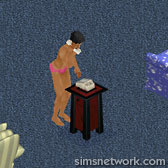 He invited all his friends to his very first pool party.
He invited all his friends to his very first pool party.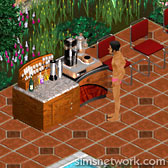 He stocked the outdoor bar and espresso counter ...
He stocked the outdoor bar and espresso counter ... ...but being a neat freak, he worried about people tracking water into the house.
...but being a neat freak, he worried about people tracking water into the house.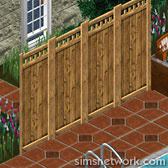 He barricaded the doors so no one would sneak in to use the bathroom.
He barricaded the doors so no one would sneak in to use the bathroom.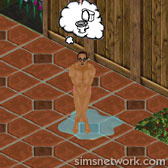 But at the party, his friends had some embarrassing moments.
But at the party, his friends had some embarrassing moments.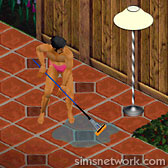 Carl realized that the barricades caused a worse result than just a wet floor.
Carl realized that the barricades caused a worse result than just a wet floor.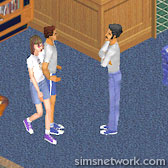 Carl had an idea -- and somehow, he convinced his friends to come to his next pool party...
Carl had an idea -- and somehow, he convinced his friends to come to his next pool party...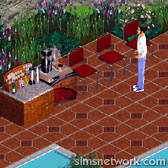 He prepared just as before...
He prepared just as before...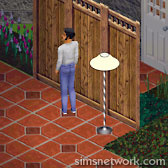
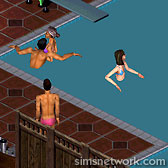 With the party in full swing, everyone seemed happy with the food and drinks...
With the party in full swing, everyone seemed happy with the food and drinks...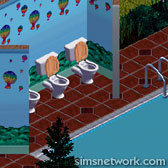 ...but they were happiest about the new pool-side additions.
...but they were happiest about the new pool-side additions.









